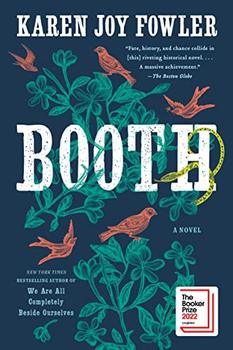Summary | Excerpt | Reading Guide | Reviews | Beyond the Book | Readalikes | Genres & Themes | Author Bio

ROSALIE
i
The Living:
Rosalie, the oldest daughter, is sitting on the steps that lead down to Beech Spring, watching her baby brother and sister make boats out of leaves. She is thinking of Ophelia, drifting in her sodden gown, her hair spread over the water, her face surrounded by flowers. She is dreaming of what it would be like to be beautiful and dead.
The month is March, the year 1838. In July, Rosalie will be fifteen years old. She finds Love Tragic easier to imagine (and honestly more satisfying) than Love Triumphant.
Rosalie is neither dead nor beautiful though the first is easier for her to imagine than the second. She resembles her father and her older brother, but in miniature, and with little feminizing of their features. Reclusive, reticent, stocky, she is not witty and graceful like the rest. Nothing is expected of her, except that she be a good girl and a help to her mother. She wants little attention and gets less – the most unremarkable child in this remarkable family.
The long winter is just coming to its end. The blackbirds have arrived, the robins are expected, and Rosalie feels the turn in her breath, in her bones. She is not quite happy, but surprisingly close to it. She feels light. Perhaps the bad times are over.
The moment she registers the feeling, it slips away. There is a palpable relief whenever Father leaves on tour. Mail day is the exception. By noon, Mother will be reading a letter from Father. The letter will be good or it will be bad. Mother will need her desperately or she won't need her at all.
The sky above the trees is pale and bare and skims in reflection over the flat surface of the water. It's not a warm day, but it's a dry one. Rosalie is wearing her shawl, her bonnet, and a pair of sturdy boots that were bought some years ago for her brother June.
June is the oldest child, recently turned seventeen. He's off in the barley fields this morning, because Father has read an article on some new fertilizing technique and so it must be tried at once. Father is always impatient for the completion of projects in which he has no part. He often berates his own father for lack of industry. Father thinks Grandfather drinks too much.
Grandfather thinks the same of Father. They quarrel about this endlessly whenever Father is home, often from their customary chairs at the Churchville Tavern, where all such arguments can be fueled by the jolly god.
Rosalie doesn't know where her grandfather is just now. Since her little brother Henry Byron died, Grandfather is often hard to find, and mostly they don't look. He comes. He goes. Sometimes he misses a meal, but not often. He used to give the children lessons, but really this was just for Henry; none of the other children are promising enough to interest him. Not June, who is more brawn than brains, a handsome, genial disappointment they once hoped would be a doctor or lawyer. Certainly not Rosalie.
Upslope, Mother appears at the door of the cabin, stands looking across the lawn. Her arms curve around her belly, holding it up like a great globe. She can't put on her shoes now or hook the laces without Rosalie's help.
Her face is in the sun, her eyes closed to better enjoy the warmth. She looks tired, but peaceful. She looks, just for the moment, like a young girl. "Someone is having a busy morning," she says, "swimming about in there." And then, opening her eyes, aging instantly back into her cares and worries, "Don't let Asia play so near the water." She vanishes back into the dark cabin.
As if Rosalie is not watching every move Asia makes.
As if Asia will do anything Rosalie asks! Asia is the youngest, if you don't count the swimmer in Mother's belly. Two years old, but only recently named and Rosalie still isn't used to thinking of her as Asia. Her parents had settled on Ayesha, or maybe Sidney, unable to choose between the two. Then suddenly, a letter from Father. "Let her be called Asia," he wrote, "because God first walked with man on that continent. With Frigga for a middle name since she was born on a Friday." Mother wasn't entirely pleased so they surreptitiously call her Asia Sidney now, and will until she's grown enough to bear the full weight of Frigga.
Excerpted from Booth by Karen Joy Fowler. Copyright © 2022 by Karen Joy Fowler. Excerpted by permission of G.P. Putnam's Sons. All rights reserved. No part of this excerpt may be reproduced or reprinted without permission in writing from the publisher.
Wisdom is the reward you get for a lifetime of listening when you'd rather have been talking
Click Here to find out who said this, as well as discovering other famous literary quotes!
Your guide toexceptional books
BookBrowse seeks out and recommends the best in contemporary fiction and nonfiction—books that not only engage and entertain but also deepen our understanding of ourselves and the world around us.